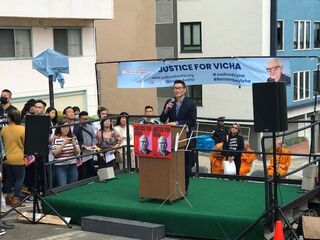Empathy
How Asian American Documentaries Promote Understanding and Empathy
Personal Perspective: Different kinds of empathy are needed for social cohesion.
Posted October 24, 2022 Reviewed by Davia Sills
Key points
- Some people don't value diverse cultural identities and opt for scapegoating instead.
- To prevent this, we need to build empathy for people who are like us and those who are not like us.
- Media, such as two recent documentaries from PBS, can provide a helpful window for us to learn about and appreciate other cultures.

Unempathic discord is dangerous for families, nations, and the world. Members of minority and marginalized groups are particularly at risk when tensions heat up, and there is insufficient understanding and empathy for either their diverse identities or for the value of diversity itself. Bonding empathy refers to empathy for those ostensibly like us. Bridging empathy refers to empathy for those not outwardly like us. We need both kinds of empathy to build a functioning society. They come more naturally to those living in demographically diverse settings. Those in more homogenous areas must rely on media, politics, and education to help cultivate bonding and bridging empathy.
Without empathy and understanding, where are we?
In the last few years, America has seen politicians and media influencers escalate and weaponize the opposite of empathy—unfounded paranoia and suspicion of immigrants, Asians, Latinos, and Black Americans—to advance their agendas. But there is indeed a long history of scapegoating and exploiting minority groups to advance abusive power in majority cultures worldwide. Psychologists Murray Bowen and Satsuki Ina have drawn attention to the ways that the majority culture scapegoats outgroups to bind anxiety. In the short term, it’s easier to feel powerful by blaming others rather than face the more complex task of facing the real vulnerabilities at hand and creating possibilities through collaboration and mutual learning.
Minority groups and vulnerable people everywhere have lived in close quarters with great peril throughout our existence. Our stories can offer important and healing messages to help the culture at large navigate distress and change to create better chances for safety, belonging, equity, and justice for all.
Two Asian American documentaries currently streaming on PBS bring these messages home and are well worth watching to help us all overcome bias and advance the causes of understanding, empathy, and democracy.
I loved An Act of Worship by Pakistani American Nausheen Dadabhoy. It’s a must-see 90-minute film that highlights the difficult history of being Muslim American, Brown, and Black over the last 45 years and the necessary work of democracy forged in participation and inclusion. I’ve written before that “I’m not one for the Oppression Olympics, but I think there is something to say about challenging identity experiences, and surely Black people and Muslim Americans vie for the leaderboard in this country.”
Gina Kim and Titi Yu’s hourlong Rising Against Asian Hate: One Day in March chronicles the aftermath of the Atlanta Spa Massacre on March 16, 2021, in community creation and political organization. Also featured is the backdrop of the rise in anti-Asian hate incidents, particularly the murder of Vicha Ratanapakdee in San Francisco in January 2021. This film is so important for many reasons—these last three years have been a galvanizing and sobering time for us as Asian Americans, and the importance of community building and allyship cannot be underestimated for mental health, physical safety, and social well-being. This doc features the biracial son of Yong Ae Yue, Robert Peterson—just one example of the connection between Asian and Black narratives and the need for solidarity.
I’m grateful to the Center for Asian American Media, based in San Francisco, for supporting these films at this critical time for American society. I hope you can set aside a few hours to watch them. (For more documentaries of note, see references.)
(C) 2022 Ravi Chandra, M.D., D.F.A.P.A.
References
Chandra R. Asian American films at PBS and DOC NYC, November 2022. East Wind eZine, October 23, 2022
Chandra R. The PBS ‘Asian Americans’ Documentary: A Critical Look by a Superfan. May 13, 2020
Chandra R. Memoirs of a Superfan film blog at the Center for Asian American Media.
Chandra R. Dr. Satsuki Ina on Migrant Detention, Racism and COVID19. Psychology Today, April 6, 2020 (includes link to her documentary CHILDREN OF THE CAMPS)


